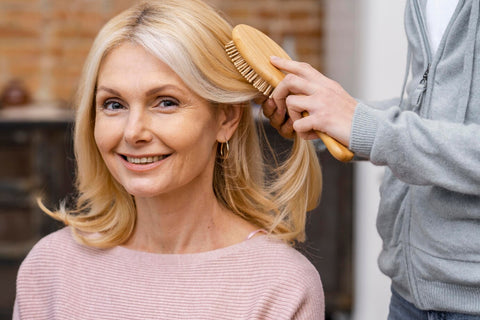Hair loss is a very common concern and although losing between 50 and 100 hairs a day is considered normal, factors such as stress , genetics, diet, hormonal changes and certain medical conditions can accelerate hair loss.
We give you some tips that can help you prevent or reduce hair loss; in this article, we explore different science-backed strategies to keep your hair healthy and strong.
A balanced diet is ESSENTIAL
Proper nutrition is essential for healthy hair. Hair needs certain nutrients to grow and stay strong:
Protein: Hair is primarily made up of protein, specifically keratin. Make sure you get enough protein in your diet through foods like meat, fish, eggs, legumes, nuts and seeds.
Iron: Iron deficiency is one of the most common causes of hair loss . Iron helps red blood cells carry oxygen to hair follicles, which is crucial for hair growth. Rich sources of iron include red meat, spinach, lentils, and broccoli.
Vitamin D: Studies have shown that vitamin D deficiency is linked to hair loss. Sun exposure and foods such as fatty fish, egg yolks, and fortified dairy products can help maintain adequate levels. Madequa offers natural, quality, scientifically-backed supplements containing vitamin D and omega-3 fatty acids.
Omega-3 fatty acids: These fatty acids help nourish hair and promote hair growth. Include foods such as oily fish (salmon, sardines), walnuts, flax seeds and chia seeds in your diet.
Madequa offers a natural, scientifically-backed option for women, with high-quality supplements, specific to each stage of menopause , containing vitamin D and omega-3 fatty acids (among other nutrients) essential to support your well-being and overall health.
Avoid stress
Physical and emotional stress is a significant factor in hair loss . Conditions such as telogen effluvium , where hair falls out in large quantities due to stress, are common. To reduce the impact of stress on your hair, we advise you to:
Meditation and relaxation techniques : Meditation, deep breathing and yoga can help reduce stress levels.
Exercise regularly : Exercise not only improves physical health, but also helps reduce emotional stress, which can have a positive effect on hair health.
Get adequate sleep : Getting enough sleep is essential for body recovery and hair health.
Maintain good hair hygiene
A clean scalp is essential to maintaining healthy hair. Washing your hair regularly removes the buildup of dirt, oil, and products that can clog hair follicles. However, it is important to:
Use a mild shampoo : Avoid shampoos that contain harsh sulfates and other harsh chemicals, as these can irritate the scalp and weaken hair.
Don't over-wash : Washing your hair every day can strip your scalp of its natural oils. Consider washing it 2-3 times a week, depending on your hair type.
Massage your scalp : When applying shampoo, gently massage your scalp to improve blood circulation, which can stimulate hair growth.
Take care of your hair with suitable products
Choosing the right hair products is essential for your hair's health. Here are some recommendations:
Nourishing conditioners : Use a conditioner after shampooing to keep your hair moisturized. Products containing natural oils such as coconut, argan or jojoba oil are beneficial.
Avoid excessive use of chemicals : Frequent use of products such as dyes, straighteners and perms can damage the hair structure and increase hair loss.
Protect hair from heat : Minimize the use of blow dryers, flat irons and curling irons, and always apply a heat protectant before using heat tools to prevent damage.
Avoid hairstyles that put stress on your hair
Tight hairstyles, such as braids, high ponytails and tight buns, can put tension on the scalp and hair follicles, causing a condition known as traction alopecia.
Choose loose hairstyles : Opt for hairstyles that do not pull on your hair excessively.
Alternate hairstyles : Change your hairstyle regularly to prevent certain areas of the scalp from being under constant pressure.
Avoid prolonged use of extensions : Hair extensions can put additional weight on natural hair, causing weakness in the follicles.
Use natural treatments
There are several natural treatments that can help strengthen hair and prevent hair loss:
Coconut Oil : This oil penetrates deep into the hair shaft, providing moisture and reducing protein loss. Massaging your scalp with coconut oil once or twice a week can improve hair health.
Rosemary Oil: Some studies suggest that rosemary essential oil may be effective in treating hair loss as it improves blood circulation in the scalp.
Aloe Vera : Aloe Vera can soothe the scalp and help maintain pH balance, which promotes healthy hair growth.
Consult a health professional
If you experience significant or unusual hair loss, it's important to see a dermatologist or trichologist. They can help identify the underlying cause and recommend appropriate treatments, which may include topical medications, supplements, or advanced medical treatments like low-level laser therapy.
Take supplements
In some cases, it can be difficult to get all the nutrients you need through diet alone. Talk to a health care professional about taking supplements such as:
Biotin: Biotin (vitamin B7) is believed to strengthen hair and nails.
Zinc: Zinc plays a crucial role in hair health, and its deficiency can cause hair loss.
Collagen : Collagen supplements can help improve hair and skin structure.
As we have already mentioned, vitamin D and omega-3 fatty acids can be great allies, which is why Madequa supplements could be an alternative. They are natural supplements, specific for each of the stages of menopause, and all of them have Omega-3 and Vitamin D as basic components, of high quality and at effective doses.
Protect your hair from environmental factors
Sun exposure, pollution and other environmental factors can damage your hair. Here are some tips to protect it:
Wear a hat or scarf : Protecting your hair from direct sunlight can prevent UV damage.
Rinse your hair after swimming : Chlorine in swimming pools and salt from the sea can dehydrate your hair. Make sure to rinse your hair with clean water after swimming.
Preventing hair loss requires a comprehensive approach that includes proper diet, targeted care, stress reduction, and adopting healthy habits. While not all forms of hair loss can be prevented, following these tips can help maintain healthy hair and reduce the risk of excessive loss. If you experience persistent hair loss, consult a professional to get a proper diagnosis and explore treatment options.
References
Trüeb RM. Nutritional factors in hair loss. Clinics in Dermatology. 2013;31(4):411-418. doi:10.1046/j.1365-2230.2002.01076.x.
Hunt N and McHale S. The psychological impact of alopecia. BMJ. 2005;331(7522):951-953. doi: 10.1136/bmj.331.7522.951.
Sofia Palma-Peña and Virginia Vivas-O'Connor. Telogen effluvium. Elsevier, Skin. 2024;39(8):487-494. doi: 10.1016/j.piel.2023.12.021 .
Almohanna HM, Ahmed AA, Tsatalis JP, Tosti A. The role of vitamins and minerals in hair loss: A review. Dermatology and Therapy. 2019;9(1):51-70.doi: 10.1007/s13555-018-0278-6.
Arck PC, Handjiski B, Hagen E, et al. Indications for a 'brain-hair follicle axis (BHA): Stress-triggered hair loss after impaired management of stress responses. FASEB Journal. 2001;15(14):2533-2535. doi:10.1096/fj.00-0699fje
Hair Loss: Causes and Treatment. National Institute of Health (NIH). 2021.




Comments (0)
There are no comments for this article. Be the first one to leave a message!